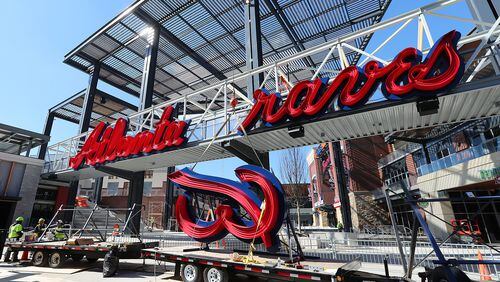The last thing an Atlanta sports fan needs right now is more pain. So in that sense maybe this will come as a relief: The Braves are not likely to make it to Game 7 of the World Series and blow a five-run lead in the bottom of the ninth, stomping on your souls once again.
When general manager John Coppolella said this week, “We don’t want to put any expectations on this season, saying we’re going to win X number of games or we’re going to make the playoffs or not make the playoffs,” it was for a reason.
Spring training opens this week. Spring is about hope. Spring is about every team starting with the same record. Spring is about planting seeds and looking up in the sky over the next six months and hoping to see sun, not locusts.
Because this has been locust central.
The Braves will “be better.”
The Braves “will be fine.”
Those were Coppolella’s words this week, leaving you to define those sound bites any way you like.
Here's what Nevada sports books see for the Braves in 2017: an over/under of 71.5 wins, which equates to 90-plus losses. If you want to debate that, fine. If you want to point to last year's 20-10 finishing kick, fine. If you want to point to another year of growth or young players and a full season of Dansby Swanson and a possibly rejuvenated Matt Kemp and an improved bullpen, fine, fine, fine, fine.
Here’s my only response: There’s a reason Las Vegas has really big casinos. The Braves’ over/under last season (66.5 wins) also came pretty close to reality (68).
There a number of things to like about the Braves. But there are still many things to wonder about, beginning with starting pitching.
Coppolella conceded, “We may have rushed some pitchers up here, such as Matt Wisler and Aaron Blair, because we didn’t have anybody else.”
So he signed 43-year-old Bartolo Colon and 42-year-old R.A. Dickey.
For two years, the Braves have attempted to rebuild with youth. Suddenly they were stealing prospects from bocce-ball leagues in east Cobb.
Pitching is the biggest question going into this season because it has been the biggest question for a while. The Braves used 20 pitchers, including eight starters, in 2014, but then went through 37 pitchers (10 starters) in 2015 and 35 (16 starters) in 2016.
Even during the 20-10 finish, the collective ERA of the starters was 5.19.
It’s expected that three-fifths of the starting rotation will be new (pending health, iron supplements and Flomax): Colon, Dickey and Jaime Garcia, who was acquired from St. Louis. Garcia threw more than 170 innings last season but had the worst ERA of his career: 4.67, including 5.60 in the second half. Julio Teheran remains the ace. Mike Foltynewicz slides in somewhere. Wisler and Blair — nobody really knows. So now you see why there’s uncertainty.
Coppolella: “We went through more starting pitchers than any team in baseball the last two years. It’s not fun.”
So why no move for a premier starter to join Teheran?
“It’s a value equation. I don’t think any of us saw the value in the deals that were offered to us so it wasn’t hard to say no. What’s hard is when you feel like you’ve made a fair offer. They wanted (prospects) A through V.”
Pause.
“We’ve gone through a lot of pain. It’s been a hard two years. I can just read that by what you’ve written. But we’re going to stick to our principles, stick to what we’ve done and we feel we have a chance to be good for a real long time.”
Yes, I’ve been hard on the Braves in general and Coppolella in particular. It wasn’t a matter of me being anti-rebuild. It was the lack of transparency from Day 1 about what he and John Hart’s true objectives were. It was the lack of accountability by the front office when things went horribly sideways. It was holding former manager Fredi Gonzalez accountable when he was dealt a losing hand and not stepping up and saying, “We did this,” when the team floundered.
And it certainly was firing one of the premier pitching coaches in baseball in Roger McDowell because somehow you came to the conclusion that he couldn’t develop young pitchers. This move stunned others in the organization and around baseball. (Ironically, now there’s some acknowledgement that Wisler and Blair were rushed to the majors.)
The Braves have some nice pieces in the everyday lineup: Freddie Freeman, Ender Inciarte, Dansby Swanson, Kemp (assuming he’s the Kemp of last August and September, not the Kemp of San Diego), Nick Markakis (ever the trade rumor).
The bench looks weak. The bullpen will be better. The bullpen will be better, won’t it?
The Braves haven’t even played a spring game yet, so making predictions is even more risky than usual. But they appear to be at best a .500 team, and even that assumes a lot. More likely: Around 75 wins, slightly above the sports-book forecast.
Coppolella: “It’s a fun team to watch.”
Front-office strategy: Keep it vague. Never mind the standings. Process, process, process. And welcome to SunTrust Park.
I asked Coppolella what the end of the rainbow looks like to him.
“The end of the rainbow is winning a World Series,” he said. “We don’t do this to finish .500 or have a nice season. The end of the rainbow is creating a championship organization. As for time limits or timetables, that’s not what drives us.”
They’ve lost 188 games in the past two seasons. At some point, there will be a time limit.
About the Author






